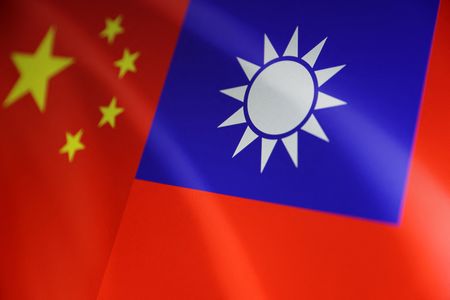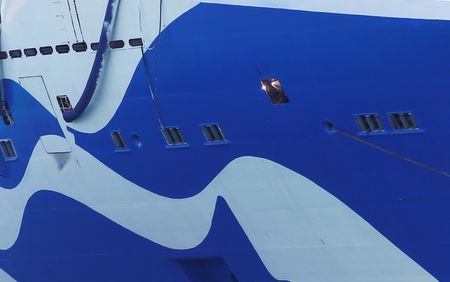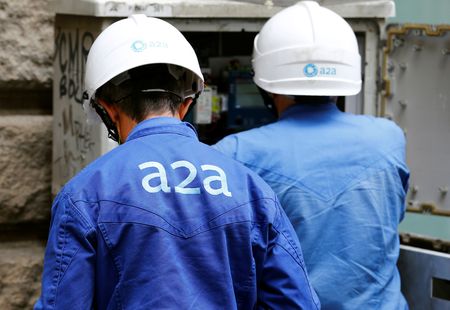By James Pomfret and Yimou Lee
HONG KONG/TAIPEI (Reuters) – The Chinese director of a firm whose vessel Taiwan suspects of having damaged an undersea communications cable said on Wednesday there was no evidence the ship was involved, an incident that has alarmed the government in Taipei.
Taiwan’s coast guard said it sent a ship to investigate a report on Friday from telecoms provider Chunghwa Telecom that an undersea communications cable had been damaged off the island’s north coast.
Arriving at the scene it found the Chinese-crewed “Shunxin 39”, registered both in Cameroon and Tanzania, which it requested to return to port in Taiwan for an investigation.
In a statement, the coast guard said bad weather kept it from boarding the ship for verification, but it “cannot rule out the possibility” the ship was engaged in “grey zone” activities. However, it did not provide any direct evidence of this.
Taiwan, which China claims as its own territory, has repeatedly complained about “grey zone” Chinese activities around the island, designed to pressure it without direct confrontation, such as balloon overflights and sand dredging.
Taiwan’s digital ministry has said the sea cable was cut on Jan. 3 but service was not affected after backup cables were activated.
Radio communications were exchanged with the ship, which is registered to a Hong Kong company called Jie Yang Trading, shipping records show.
In his first public comments on the incident, Guo Wenjie, the director of Jie Yang, denied any involvement of the ship, though confirming it was in the area. Taiwan authorities did not detain it after radio exchanges with the captain, he added.
“There’s no evidence at all,” he told Reuters by telephone, dismissing the accusation that it was responsible for damage. “I spoke to the ship captain and for us it was a normal trip.”
Speaking in Mandarin, Guo confirmed the ship was owned by Jie Yang Trading, shown by Hong Kong companies registry records to have been set up in 2020, with Guo as the sole director.
Its listed Hong Kong address was a single room in a co-sharing office space for a secretarial services company in a gritty industrial building.
‘COMMON ACCIDENTS’
In a written statement sent to Reuters late Wednesday, China’s Taiwan Affairs Office said globally there were more than 100 such incidents of damage to undersea cables a year and they are “common maritime accidents”.
With the facts still unclear, Taiwan is making accusations “out of thin air” and intentionally hyping up the “so-called grey zone threat from the mainland”, it added, without directly saying whether the ship in question was involved or not.
Taiwan, which strongly rejects China’s sovereignty claims, says communications were unaffected by the cable damage.
Responding to Guo’s comments, Taiwan’s coast guard said it was not yet able to gauge the ship’s “real intention” from tracking data.
The vessel had lingered in the waters just off Taiwan’s north since early December until its transmitting signal was turned off on Jan. 3, shipping data showed.
Guo declined to specify why the ship had remained in the area, or the purpose of the voyage, but said the Taiwan authorities had only sought details of its GPS movements.
“I don’t understand why there has been so much news about this,” Guo said. “The ship had dropped anchor, so it had stopped in the nearby waters.
“We followed the rules and normal procedures. If not, then Taiwan would have investigated and detained us.”
The incident has alarmed Taiwan’s security officials, who are set to brief Taipei-based diplomats on the matter this week, say sources familiar with the matter.
“We must inform everyone that such behaviour doesn’t just affect Taiwan. It could also hit international communications,” a senior Taiwan security official told Reuters on condition of anonymity as the matter is a sensitive one.
“It is relevant to the interests of many countries.”
Taiwan has been particularly nervous about the vulnerability of undersea communications cables following incidents of complaints by Baltic Sea nations since Russia’s invasion of Ukraine in 2022.
Last month, Taiwan’s Presidential Office held its first “tabletop” exercise involving government agencies beyond the armed forces, simulating scenarios such as a military escalation with China and severed international sea links, officials said.
In 2023, two undersea cables with the Taiwan-controlled Matsu islands, which sit close to the Chinese coast, were cut, disconnecting their 14,000 residents from the internet.
Authorities said at the time initial findings showed a Chinese fishing vessel and a Chinese freighter caused the disruption, but there was no evidence Beijing deliberately tampered with the cables.
In recent years, Taiwan has worked to beef up its capacity to cope with emergencies from disasters to military conflict, including alternative communications such as satellites if its international sea cables are cut.
(Reporting by James Pomfret and Yimou Lee; Additional reporting by Ryan Woo in Beijing; Writing by Ben Blanchard; Editing by Clarence Fernandez and Mark Potter)











